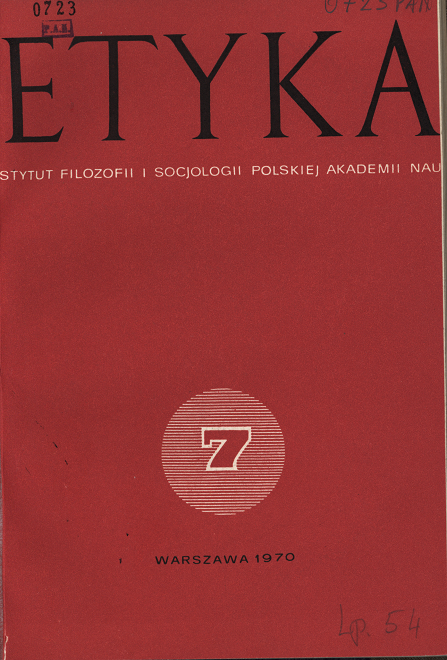Przyczynek do kwestii statusu ocen w języku nauki
Abstract
The author quotes some opinions according to which the valuations have no cognitive value: (1) the valuations have no truth-value; (2) they cannot be decided basing on experience; (3) the have no significance in the semiotic sense of the term; (4) no problematic of the semiotic characteristic of valuation should be taken up, as they are not problems of cognitive value; (5) valuative expressions do not belong to the science. The author analyses mainly the 5th opinion. It can be understood in three ways: (a) as a summary of an actual development stage of the science; (b) as a methodological thesis being a component of some methodological model of a science, and (c) as a directive addressed to scientists and recommending them to eliminate valuations from their science. In every of the above meaning the 5th opinion is to be rejected. In the interpretation (a) it is a trivial falsehood, in the interpretation (c) it is ineffective as a guide line of an action, and in the interpretation (b) it assumes an inadequate reconstruction of a science, for it is possible to carry out such a reconstruction which would make possible an occurring of valuations in the science which do not lose anything of their adequacy in other respects. Designing such a reconstruction the author takes as a point of departure a distinction between objective valuations (which are sentences in the logical meaning) and purely expressive valuations (which are not sentences in the logical meaning). The former may be used as scientific assumptions and the latter – being deprived of logical value – only as criteria in the choice of problems. It is evident, however, that the sole existence of valuations in a role of scientific assumption does not disturb a realization of the paramount aim of scientific investigations, i.e. resolutions of problems formulated by the scientists. This can only take place when some additional conditions are fulfilled which the author is trying to formulate in a general way.Downloads
Published
Issue
Section
License
Works published in ETYKA are available under the Creative Commons Attribution No Derivatives 4.0 International Licence (CC BY-ND), which entails acknowledgement of authorship without derivative works. Under this licence, Authors keep their copyrights and agree that their works can be used again legally for any purpose, including commercial ones, except for the creation of derivative works, without the need to obtain previous consent of the Author or publisher. The articles can be downloaded, printed, copied and disseminated; under the condition that the authorship is indicated accordingly, together with the place of original publication. The Authors preserve their copyrights to the above-mentioned works without any limitation whatsoever.



